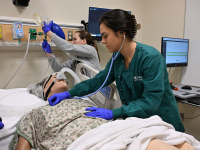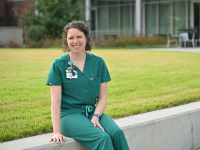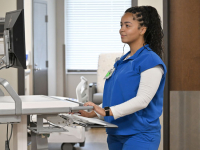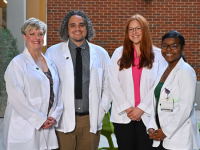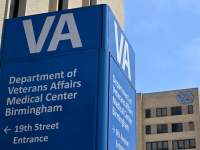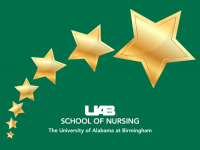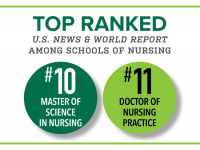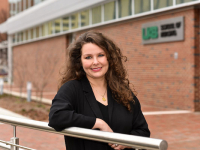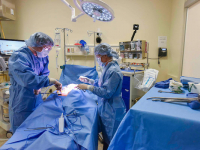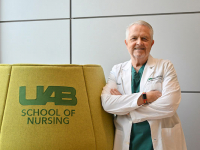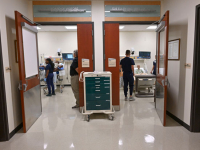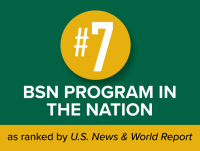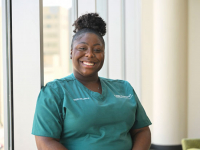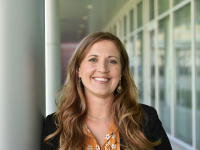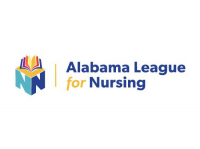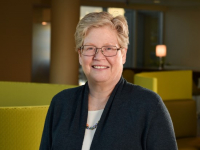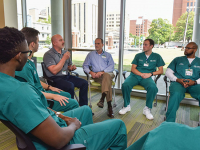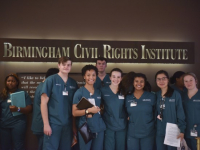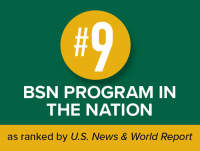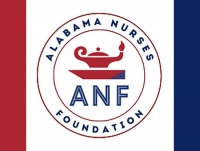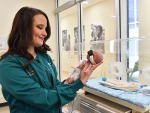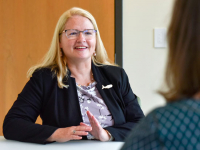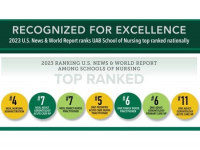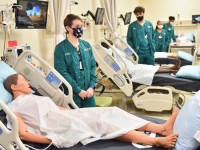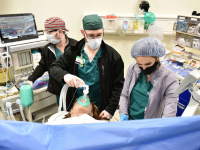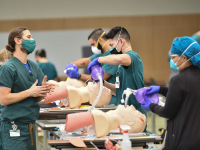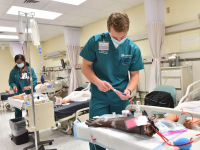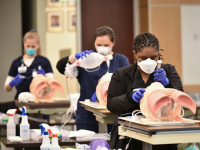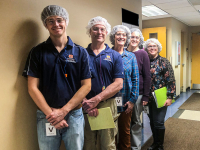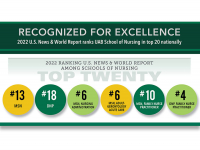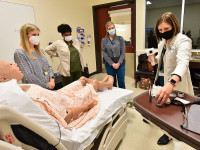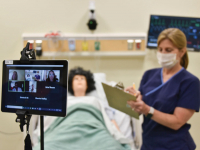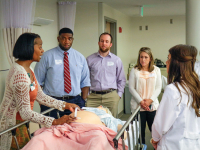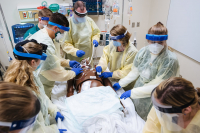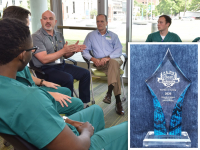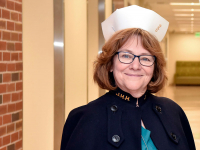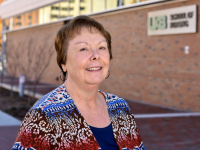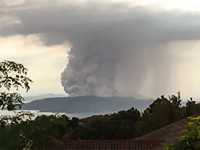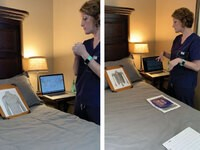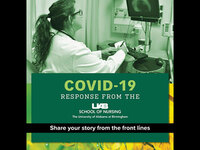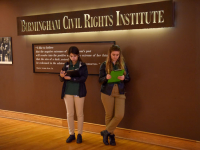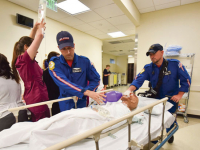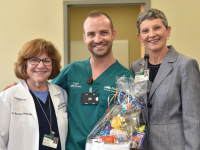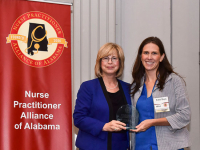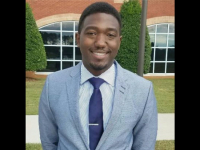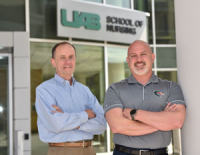Exciting things are happening within the University of Alabama at Birmingham (UAB) School of Nursing’s Master of Science in Nursing (MSN) Nurse Anesthesia Specialty Track, and more are to come, according to Associate Professor and Specialty Track Coordinator Susan McMullan, PhD, CRNA.
Within the last year, the nurse anesthesia specialty track has seen its first-time board pass rate climb, has been the impetus for the School to establish a Bachelor of Science in Nursing (BSN)-to-Doctor of Nursing Practice (DNP) degree program, and has had its students make their marks on several state and national CRNA-related organizations.
“We have been working hard to provide high-quality professionals locally and globally to improve patient care and accessibility to nurse anesthesia services, and will continue to do so,” McMullan said. “Things are really sailing along smoothly for us, and we believe there will be even more opportunities for success ahead.”
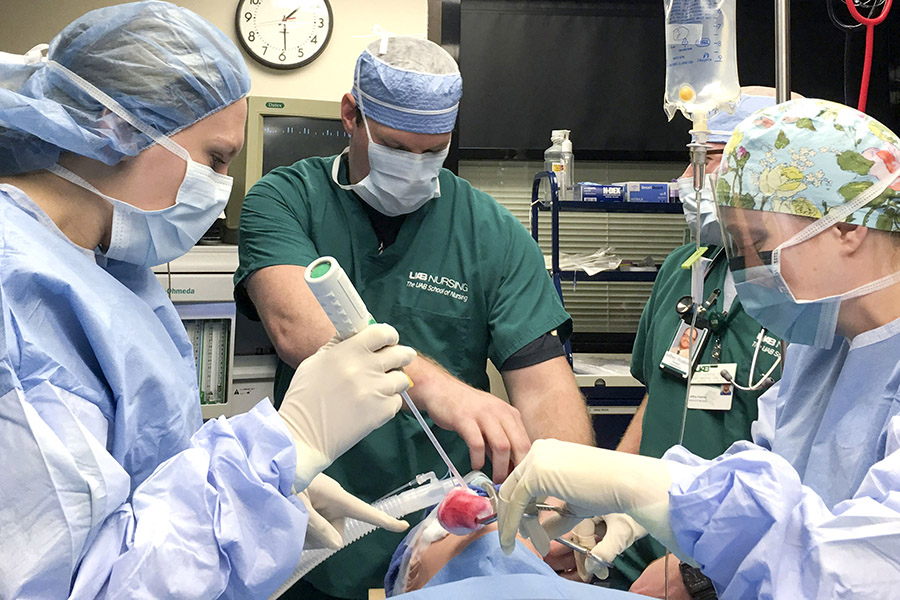 Extensive simulations are just one of the many aspects of the Nurse Anesthesia Specialty Track that make it one of the top-rated programs in the country for preparing CRNAs to impact health care globally.One of the most tangible of the track’s exciting developments is the improvement of the first-time pass rate among those students taking the National Board of Certification & Recertification for Nurse Anesthetists (NBCRNA) exam. That rate has now surged to 93 percent, well above the national average of 84.5 percent. The overall pass rate for the 2016 graduating class is 100 percent; the employment rate within three months of graduation for the class is 100 percent as well.
Extensive simulations are just one of the many aspects of the Nurse Anesthesia Specialty Track that make it one of the top-rated programs in the country for preparing CRNAs to impact health care globally.One of the most tangible of the track’s exciting developments is the improvement of the first-time pass rate among those students taking the National Board of Certification & Recertification for Nurse Anesthetists (NBCRNA) exam. That rate has now surged to 93 percent, well above the national average of 84.5 percent. The overall pass rate for the 2016 graduating class is 100 percent; the employment rate within three months of graduation for the class is 100 percent as well. McMullan, who joined the faculty in early 2015, and her nurse anesthesia colleagues in the School, Assistant Professor Todd Hicks, DNP, MNA, CRNA, Assistant Professor Bryan Wilbanks, DNP, CRNA, and Instructor Kaitlen Woodfin, MSN, CRNA, took a multi-pronged approach to improving those scores. They worked to enhance the rigor of the existing curriculum and instituted a novel board review course for seniors
McMullan is quite pleased with the results.
“I am very impressed by how hard the students worked to achieve those scores,” McMullan said. “We provided the opportunities for learning, and they are the ones who did the work. I am very proud of them.”
Another significant accomplishment is the approval of the School’s application for recognition of its BSN-to-DNP program by The Council on Accreditation of Nurse Anesthetists (COA).
After 2015, COA no longer accredits MSN-degree programs for nurse anesthesia. Also, effective Jan. 1, 2022, nurse anesthesia students accepted into accredited entry-level programs will be required to graduate with doctoral degrees.
“One of the things that really propelled us to establish the BSN-to-DNP pathway at the UAB School of Nursing was our nurse anesthesia specialty track,” said Dean and Fay B. Ireland Endowed Chair in Nursing Doreen C. Harper, PhD, RN, FAAN. “We needed to be sure our nurse anesthesia track, the state’s only publicly funded program of its kind, could be accredited in the future, and to do that we had to establish the BSN-to-DNP pathway. That really accelerated the need for this transition for us.”
| “With all the changes Dr. McMullan is implementing, the program is better today than when I applied." -- John Woods |
“It’s going to be a challenge having a new curriculum, but it is a good one, and we anticipate a seamless transition,” McMullan said.
Students in the nurse anesthesia specialty track have also begun to impact health care locally and globally through service to various organizations.
Senior John Woods, BSN, SRNA, the School’s student representative to the American Association of Nurse Anesthetists (AANA) Foundation, helped plan and execute the Foundation’s annual fund-raiser dinner and dance at the Nurse Anesthesia Annual Conference in Washington, D.C. last September. Woods and five other UAB Nurse Anesthesia students attended the event, including alumna Vanessa Brown, CRNA, MSN, who participated on the winning student team in the annual AANA College Bowl competition.
Senior Brittany Oursler, RN, BSN, will represent the School at the AANA Mid-year Assembly in Washington, D. C., in August, and senior Ashley Boon, RN, MSN, CRNP/RNFA, is the student representative to the Alabama Association of Nurse Anesthetists (ALANA).
“I love serving in that role,” Boon said. “I have gotten to meet great people from all over the state. I have also gotten to attend various board meetings which gives me an idea of the logistics behind the entire ALANA and how it functions to be a voice for CRNAs in the state of Alabama.”
It is also a way to make very important connections, a fact McMullan stresses when encouraging her students to become involved in such endeavors.
“We do great things here, and we need to get out and tell people about what we are doing,” McMullan said. “It is important to our school and our students that they participate in state and national events and support state and national organizations.”
Other recent milestones for the nurse anesthesia specialty track include:
• By unanimous support of various members and committees, the International Federation of Nurse Anesthetists (IFNA) renewed the School’s Level #2 Recognition for five years. The renewal means the track remains one of just 21 programs internationally and only six within the United States to have received this prestigious IFNA designation.
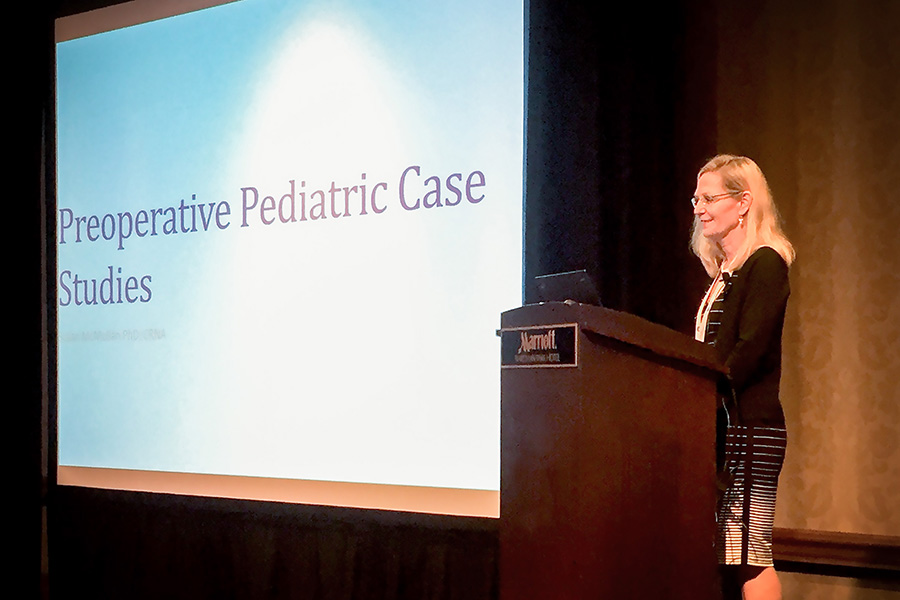 Dr. Susan McMullan making her presentation to the AANA National Congress in Washington, D.C., in September 2016. • McMullan, who has been a CRNA for more than 28 years, presented at the AANA National Congress in September 2016. She provided a case study review and a podium presentation on the topic “Preoperative Preparation of the Pediatric Patient.”
Dr. Susan McMullan making her presentation to the AANA National Congress in Washington, D.C., in September 2016. • McMullan, who has been a CRNA for more than 28 years, presented at the AANA National Congress in September 2016. She provided a case study review and a podium presentation on the topic “Preoperative Preparation of the Pediatric Patient.”• Hicks was promoted to assistant program director in August 2016
• The faculty grew with the addition of Wilbanks, who splits his time between the nurse anesthesia and nursing informatics specialty tracks. The School is also currently recruiting for the hiring of an additional faculty member in the near future.
• McMullan was honored with the Employer Support of the Guard and Reserve Patriotic Employer Award for her support of students who serve in the United States military.
The nurse anesthesia specialty track has made great strides in a short time and much of the credit goes to McMullan said Woods, who was influenced to chose the UAB School of Nursing’s program in the first place by its already stellar reputation.
“With all the changes Dr. McMullan is implementing, the program today is better than when I applied,” Woods said. “The focus is on much more than just getting us a degree, and it benefits us as students in more ways than we realize.”

